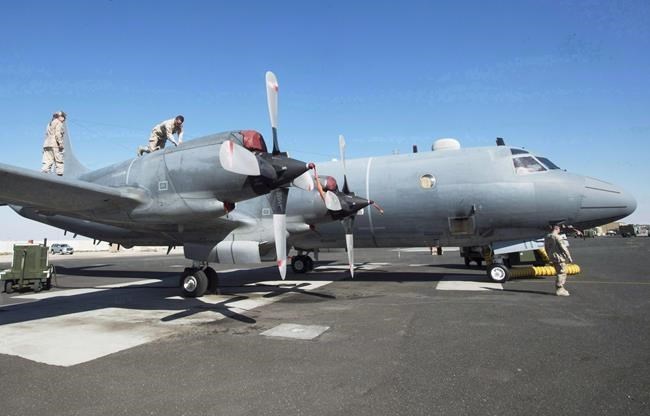MONTREAL — The patrol planes Bombardier Inc. hopes could replace aging Canadian military aircraft will have a price "competitive" with that of jets from rival Boeing Inc., the Montreal-based company says.
The business jet maker joined forces earlier this year with U.S.-based General Dynamics on a surveillance aircraft with submarine-hunting technology. Both partners are calling on the federal government to launch an open procurement process to supplant the Royal Canadian Air Force's 14 CP-140 Aurora maritime patrol planes, built by Lockheed Martin and set to retire in 2030 after a half-century of service.
The price of the 16 P-8A Poseidons and associated gear that Boeing aims to sell to Ottawa amounts to US$5.9 billion, according to a June 27 post from the U.S. Defence Security Cooperation Agency.
That total is one Bombardier can compete with, said Bombardier vice-president of public affairs Pierre Pyun. "We are absolutely convinced of that," he said in French, though the company declined to name a price.
"For us to be able to put forward a price, there would have to be a request for proposals, then there would have to be specific requirements," he told reporters during a presentation last week at the Bombardier plant in Montreal.
Public Services and Procurement saąúĽĘ´«Ă˝ describes Boeing’s P-8s as "the only currently available aircraft that meets all of the CMMA (Canadian Multi-Mission Aircraft) operational requirements" — particularly around intelligence gathering, surveillance and anti-submarine warfare.
Bombardier’s plane, a modified version of the Global 6500 business jet equipped with tech and sensors from General Dynamics, so far exists on paper only, though the manufacturer says the aircraft will be ready by the early 2030s, in line with the government's needs.
Anne-Marie Thibaudeau, director of programs at Bombardier Defense, said it's "a very a normal thing" for companies to receive a contract for a product that has yet to be furnished.
"Governments or military services tend to require unique characteristics systems or radars on their aircraft, so they are usually full-on development programs," she said.
"Boeing claims to have an aircraft that is available earlier, but it is also an aircraft that is at the end of its life and whose production line, according to Boeing, will be finished in (2025) if there are no other orders," she added in French.
Bombardier has sat down with Defence Minister Anita Anand and Industry Minister François-Philippe Champagne to discuss its surveillance planes, Pyun said.
The federal government has said it is still weighing its options for the multibillion-dollar contract.
Boeing disagreed with Bombardier's assertion that Poseidons have reached the end of their runway.
“There continues to be robust demand for P-8 aircraft and we will continue to build P-8s as long as we have demand for them," the Virginia-based company said in an email Monday.
Boeing is currently building 11 more P-8 Poseidons for the U.S. navy, on top of the 117 already delivered, it said. A planned service life of 25 years extends the navy's P-8 program to nearly 2050, and possibly beyond, the company said.
The federal Procurement Department in February 2022 issued a letter of request for an offer on 16 Poseidons, sent via the U.S. government's foreign military sales program. The government said in an email that ask "does not commit saąúĽĘ´«Ă˝ to purchasing the P-8A Poseidon and the project remains in options analysis."
The final decision will be based on capability and pricing as well as benefits to Canadian industry, it added.
Nonetheless, Bombardier sees the letter and subsequent actions as tantamount to a sole-source bidding process.
So do some premiers.
Quebec Premier François Legault said he and Ontario Premier Doug Ford have asked their fellow first ministers to put patrol plane procurement on the agenda at a meeting of provincial and territorial heads of government in Winnipeg.
"We would like that Bombardier has an opportunity to table a proposal, instead of going directly with Boeing," Legault told reporters as the three-day event kicked off Monday.
"Of course, we can understand that the U.S. government must put a lot of pressure on the Canadian government. But we have a Canadian company, Bombardier, having plants in Ontario, in Quebec, that can supply what is needed."
Last week, that company sought to bolster its economic case for sourcing a multibillion-dollar military contract to a Canadian outfit.
Citing a PwC report commissioned by Bombardier, it said a contract would furnish 22,650 jobs directly — nearly 11,000 in Ontario, 6,550 in Quebec and close to 4,200-plus in Atlantic saąúĽĘ´«Ă˝. It would also add $2.8 billion to the gross domestic product and yield $800 million in tax revenue, the study projected.
Boeing has also tried to tout its Canadian bona fides.
The aircraft giant's P8-A Poseidons would sustain more than 2,900 jobs and generate $358 million in economic output in saąúĽĘ´«Ă˝ annually, according to a Boeing-commissioned study by management consultants Doyletech Corp.
"In strong collaboration with our Canadian industry P-8 partners and our extensive supply chain in-country, we appreciate the opportunity to build upon our more than 100-year relationship with saąúĽĘ´«Ă˝ and grow our Canadian partnerships and investments," Ted Colbert, CEO of Boeing Defense, Space and Security, said in a statement on May 30.
Bombardier and Boeing have clashed before. In 2020, the former sold its remaining stake in the A220 jetliner program, marking the end of its failed bid to take on the commercial aircraft duopoly of Airbus and Boeing.
In 2018, a U.S. trade panel ruled that Boeing suffered no harm due to competition from Bombardier, despite the U.S. plane maker's claim that its northern rival sold C Series jets to Delta Air Lines at "absurdly" low prices while enjoying subsidies from the federal and Quebec governments.
The spat was spiralling upward before the decision, with Ottawa threatening to ditch plans to purchase 18 fighter jets from Boeing.
This report by The Canadian Press was first published July 10, 2023.
Companies in this story: (TSX:BBD.B)
Christopher Reynolds, The Canadian Press



